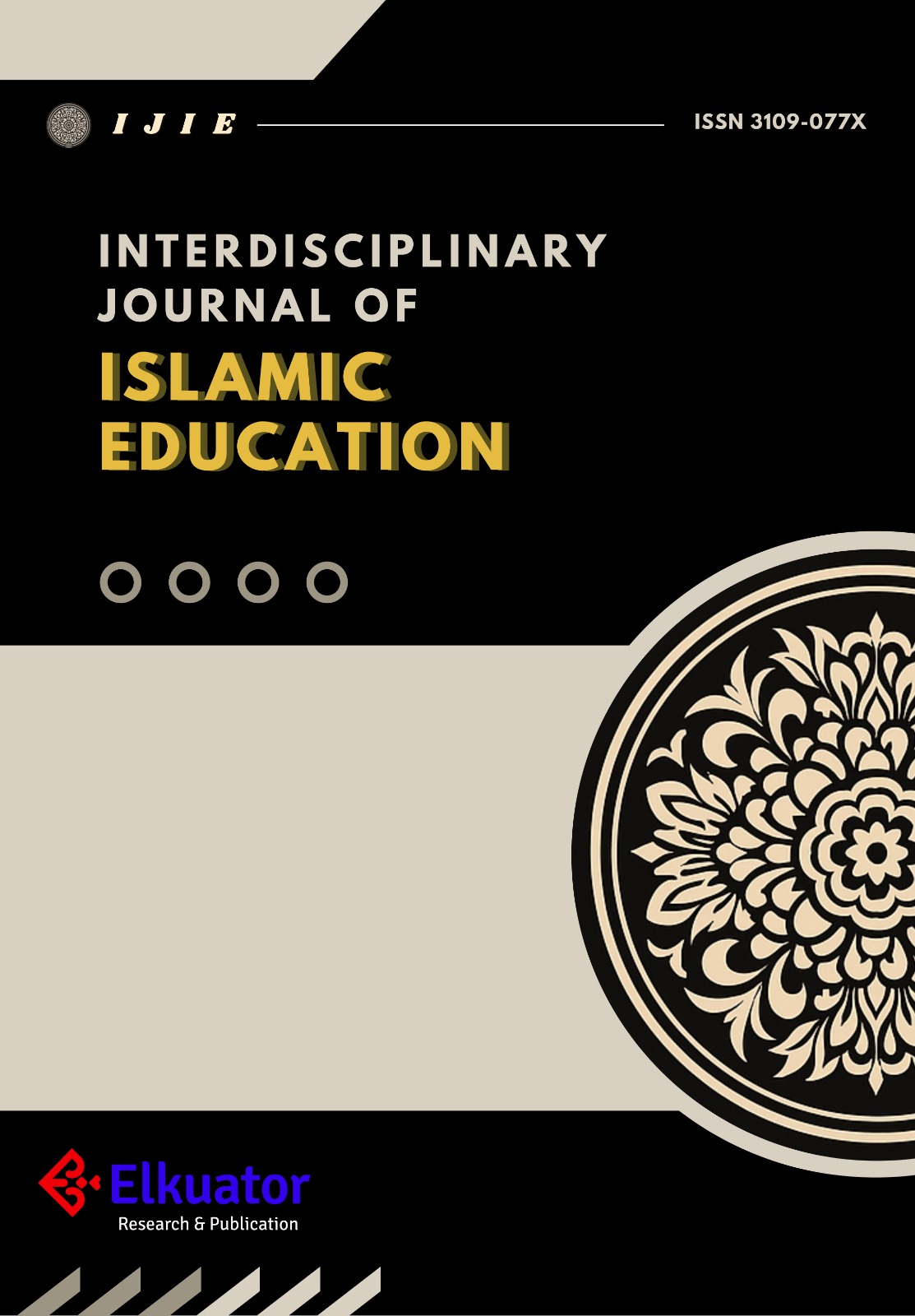Negotiating Customary Law and Fiqh Norms: The Transformation of the Mepahukh Tradition in the Indigenous Marriage Practices of the Alas People in Southeast Aceh
DOI:
https://doi.org/10.24260/ijssls.1.1.9Keywords:
Alas People, Customary Law, Fiqh, Marriage, Mepahukh TraditionAbstract
Custom-based matchmaking practices in Muslim communities often experience tension between cultural authority and religious normative frameworks. However, comprehensive studies exploring the negotiation between local traditions and fiqh (Islamic jurisprudence) norms in contemporary contexts remain limited. This article examines the transformation of mepahukh, a customary courtship ritual performed during wedding celebrations among the Alas people in Southeast Aceh, through the lens of negotiation between customary law and fiqh-oriented norms. Utilizing a socio-legal approach and a fieldwork-based research design, this study draws on primary data collected through semi-structured interviews with eight key informants, including a village head, customary leaders, local religious authorities, and young people, as well as non-participant observation of the ritual’s implementation. The findings reveal that while mepahukh continues to function as a social mechanism for strengthening marital alliances and reproducing ethnic identity, it is increasingly subject to normative scrutiny due to negative perceptions of ikhtilāṭ (unsupervised interaction between non-maḥram men and women) and concerns regarding moral permissiveness. In response to growing criticism from religious authorities, the Alas community has adopted adaptive strategies, including family deliberations, procedural restrictions, and enhanced roles for customary and religious leaders. This article argues that mepahukh is not a static cultural artifact but a dynamic space for value negotiation within the inter-legalities between customary and Islamic law. The sustainability of this tradition depends on the community’s ability to reformulate its practices in ways that are ethical, context-sensitive, and aligned with both cultural norms and religious principles.
[Praktik perjodohan berbasis adat dalam masyarakat muslim kerap menghadapi ketegangan antara otoritas kultural dan kerangka normatif agama. Namun demikian, kajian komprehensif yang secara mendalam mengeksplorasi dinamika negosiasi antara tradisi lokal dan norma fikih dalam konteks kontemporer masih relatif terbatas. Artikel ini menganalisis transformasi tradisi mepahukh—sebuah ritus perjodohan adat yang dilaksanakan pada malam hari dalam rangkaian pesta perkawinan masyarakat Alas di Aceh Tenggara—dalam kerangka negosiasi antara hukum adat dan norma-norma fikih. Dengan menggunakan pendekatan sosio-legal dan desain penelitian berbasis lapangan, artikel ini mengandalkan data primer dari wawancara semi-terstruktur dengan delapan informan kunci, yang terdiri atas kepala desa, tokoh adat, otoritas keagamaan, dan pemuda-pemudi yang terlibat, serta observasi non-partisipatif terhadap pelaksanaan tradisi tersebut. Temuan menunjukkan bahwa meskipun mepahukh tetap berfungsi sebagai mekanisme sosial untuk membentuk aliansi pernikahan dan mereproduksi identitas etnik, praktik ini semakin mendapat tekanan normatif akibat persepsi negatif terhadap ikhtilāṭ (interaksi bebas antara laki-laki dan perempuan non-mahram) dan kekhawatiran atas kemerosotan moral. Merespons kritik dari kalangan tokoh agama, komunitas Alas menunjukkan kapasitas adaptif melalui musyawarah keluarga, pembatasan teknis, serta penguatan peran tokoh adat dan agama. Artikel ini berargumentasi bahwa mepahukh bukanlah artefak budaya yang statis, melainkan ruang negosiasi nilai yang berlangsung dalam konteks interlegalitas antara hukum adat dan norma fikih. Keberlanjutan tradisi ini bergantung pada kapasitas komunitas untuk mereformulasi praktiknya secara etis, kontekstual, dan selaras dengan prinsip budaya maupun agama.]
References
Abdullah, A. “Legal Pluralism and Inclusivity: The Integration of Sharia and Civil Law in Brunei’s Legal System.” Journal of Islamic Law Studies 14, no. 3 (2020): 215–30.
Alfarisi, Muhammad Adib, Muhammad Jihadul Hayat, and Adul Rahim Hakimi. “Solving Pregnancy Out-of-Wedlock: ‘Dual Validity’ of Ngampang Marriage among Dayak Muslim Community in Sintang, Indonesia.” Journal of Islamic Law 4, no. 2 (August 1, 2023): 123–47. https://doi.org/10.24260/jil.v4i2.1283.
Anggraeni, RR Dewi. “Islamic Law and Customary Law in Contemporary Legal Pluralism in Indonesia: Tension and Constraints.” AHKAM: Jurnal Ilmu Syariah 23, no. 1 (June 16, 2023): 25–48.
ARR. Interview with a Young Woman of Kutacane, December 2023.
Asri, Salwa Farhani. “Pergeseran Adat Meupahukh dalam Tradisi Pernikahan dan Pengaruhnya terhadap Realitas Sosial Agama (Studi Kasus di Desa Terutung Seperai terhadap Realitas Agama).” Thesis, UIN Ar-Raniry, 2020.
Auda, Jasser. Maqasid Al-Shariah as Philosophy of Islamic Law: A Systems Approach. London: The International Inst. of Islamic Thought, 2008.
Badan Pusat Statistik Provinsi Aceh. Indikator Kesejahteraan Masyarakat Provinsi Aceh. Vol. 11000.2336. 4102004.11. Aceh: Badan Pusat Statistik Provinsi Aceh, 2024.
Banane, Mohamed Cheikh, Souad Ezzerouali, and Ahmed Mohamed Elzein. “The Struggle for Land in Morocco: A Case Study of Amazigh.” Mazahib 23, no. 2 (December 9, 2024): 391–430. https://doi.org/10.21093/mj.v23i2.8627.
Bustamam-Ahmad, Kamaruzzaman. “From Power to Cultural Landscapes: Rewriting History of Shi‘ah in Aceh.” Journal of Indonesian Islam 11, no. 2 (December 5, 2017): 509–30. https://doi.org/10.15642/JIIS.2017.11.2.509-530.
Cammack, Mark. “Islamic Inheritance Law in Indonesia: The Influence of Hazairin’s Theory of Bilateral Inheritance.” Studia Islamika 10, no. 1 (January 1, 1970): 97–122. https://doi.org/10.15408/sdi.v10i1.639.
Coulson, Noel J. A History of Islamic Law. Piscataway, N.J: Transaction, 2011.
Djawas, M., A. Nurdin, M. Zainuddin, Idham, and Z. Idami. “Harmonization of State, Custom, and Islamic Law in Aceh: Perspective of Legal Pluralism.” Hasanuddin Law Review 10, no. 1 (2024): 64–82. https://doi.org/10.20956/halrev.v10i1.4824.
Elfia, Elfia, Surwati Surwati, and Bakhtiar Bakhtiar. “The Struggle of Custom and Sharia: Classic Dilemma of Inheritance Settlement in Javanese and Minangkabau Ethnic Communities in Indonesia.” Al-Istinbath: Jurnal Hukum Islam 8, no. 1 (May 16, 2023): 75–94. https://doi.org/10.29240/jhi.v8i1.5480.
Ezzerouali, Souad. “Expanding the Authority of Muhtasib to Protect Consumers: A Comparison between Moroccan Law and Islamic Qanun of Aceh.” Trunojoyo Law Review 7, no. 2 (March 15, 2025): 161–91. https://doi.org/10.21107/tlr.v7i2.29151.
Fahmi, Mutiara, Nurhayati Ali Hasan, Iskandar Usman, Amiruddin Abdullah, and Muhibuddin Hanafiyah. “Punishment for Zina Muḥṣān Offenders in Aceh Qanun No. 6 of 2014 in the Perspective of Fiqh al-Siyāsah.” Samarah: Jurnal Hukum Keluarga dan Hukum Islam 6, no. 1 (June 27, 2022): 346–68. https://doi.org/10.22373/sjhk.v6i1.13363.
Feener, R. Michael. Shariʿa and Social Engineering: The Implementation of Islamic Law in Contemporary Aceh, Indonesia. Oxford: Oxford University Press, 2013. https://doi.org/10.1093/acprof:oso/9780199678846.001.0001.
Field Notes from Observation, December 2023.
Fox, James J. “Notes on the Southern Voyages and Settlements of the Sama-Bajau.” Bijdragen Tot de Taal-, Land- En Volkenkunde / Journal of the Humanities and Social Sciences of Southeast Asia 133, no. 4 (1977): 459–65. https://doi.org/10.1163/22134379-90002606.
Giddens, Anthony. The Constitution of Society: Outline of the Theory of Structuration. Cambridge: Polity press, 1986.
Gopalkrishnan, Narayan, and Hurriyet Babacan. “Ties That Bind: Marriage and Partner Choice in the Indian Community in Australia in a Transnational Context.” Identities 14, no. 4 (October 15, 2007): 507–26. https://doi.org/10.1080/10702890701578498.
Hadi, Amirul. “Aceh in History: Preserving Traditions and Embracing Modernity.” MIQOT: Jurnal Ilmu-Ilmu Keislaman 37, no. 2 (April 14, 2016): 449–64. https://doi.org/10.30821/miqot.v37i2.92.
Hamdani, Fahmi Fatwa Rosyadi Satria, Suci Pebrianti, Liza Dzulhijjah, and Hudzaifah Muhammad Maricar. “Traditional Law vs. Islamic Law; An Analysis of Muslim Community Awareness in Inheritance Issues.” Al-Ahkam 32, no. 1 (April 28, 2022): 109–30. https://doi.org/10.21580/ahkam.2022.32.1.11000.
Hense, Andrea, and Marén Schorch. “Arranged Marriages as Support for Intra‐ethnic Matchmaking? A Case Study on Muslim Migrants in Germany.” International Migration 51, no. 2 (April 2013): 104–26. https://doi.org/10.1111/j.1468-2435.2010.00631.x.
Hidayati, Rahmi, Illy Yanti, Muhammad Farhan Hr, and Shahrul Hilmi Othman. “Dynamics of Child Marriage in Suku Anak Dalam Community.” Justicia Islamica 20, no. 2 (October 30, 2023): 261–80. https://doi.org/10.21154/justicia.v20i2.5975.
Hoekema, André J. “European Legal Encounters between Minority and Majority Cultures: Cases of Interlegality.” The Journal of Legal Pluralism and Unofficial Law 37, no. 51 (January 2005): 1–28. https://doi.org/10.1080/07329113.2005.10756585.
Hull, Kathleen L. “Death and Sex: Procreation in the Wake of Fatal Epidemics within Indigenous Communities.” In The Archaeology of Colonialism, edited by Barbara L. Voss and Eleanor Conlin Casella, 1st ed., 122–37. New York: Cambridge University Press, 2011. https://doi.org/10.1017/CBO9780511920011.010.
IA. Interview with a Young Man of Kutacane, December 2023.
Ilyas, Ilyas, Faisal A.Rani, Syamsul Bahri, and Sufyan Sufyan. “The Accommodation of Customary Law to Islamic Law: Distribution of Inheritance in Aceh from a Pluralism Perspectives.” Samarah: Jurnal Hukum Keluarga dan Hukum Islam 7, no. 2 (May 28, 2023): 897–919. https://doi.org/10.22373/sjhk.v7i2.15650.
Inayatillah, Inayatillah, Mohd Roslan Mohd Nor, Asy’ari Asy’ari, and Muhammad Faisal. “Social History of Islamic Law from Gender Perspective in Aceh: A Study of Marriage Traditions in South Aceh, Indonesia.” Samarah: Jurnal Hukum Keluarga dan Hukum Islam 6, no. 2 (October 7, 2022): 573–93. https://doi.org/10.22373/sjhk.v6i2.14598.
Judiasih, Sonny Dewi, and Efa Laela Fakhriah. “Inheritance Law System: Considering the Pluralism of Customary Law in Indonesia.” Padjadjaran Jurnal Ilmu Hukum (Journal of Law) 5, no. 2 (September 24, 2018): 315–30.
Khairuddin, Khairuddin. “Memakai Hine sebagai Syarat dalam Perkawinan pada Masyarakat Kuta Tinggi Aceh.” Al-Ahwal: Jurnal Hukum Keluarga Islam 13, no. 2 (December 10, 2020): 108–18. https://doi.org/10.14421/ahwal.2020.13202.
Khan, Hamid M. “Islamic Law, Customary Law, and Afghan Informal Justice.” US Institute of Peace, 2015. https://www.jstor.org/stable/resrep12147.
Kim, Minjeong. “Gendered Desire and Heteronormativity in the Transnational Matchmaking Process.” In Advances in Gender Research, edited by Marcia Texler Segal, Esther Ngan-Ling Chow, and Vasilikie Demos, 16:15–38. Emerald Group Publishing Limited, 2012. https://doi.org/10.1108/S1529-2126(2012)0000016005.
Lukito, Ratno. Hukum Sakral dan Hukum Sekuler: Studi tentang Konflik dan Resolusi dalam Sistem Hukum Indonesia. 1. Ciputat, Tangerang: Pustaka Alvabet, 2008.
———. Islamic Law and Adat Encounter: The Experience of Indonesia. Canada: McGill University, 1997.
Luthfi, Muhammad, and Nu’man Aunuh. “Study of the Kawin Tangkap Tradition of Sumba: Conception ’Urf and the Sexual Violence Crimes Act.” Audito Comparative Law Journal (ACLJ) 6, no. 2 (April 28, 2025): 97–110. https://doi.org/10.22219/aclj.v6i2.40373.
MS. Interview with a Religious Figure of Kutacane, February 2024.
Murdan, Murdan. “Harmonisasi Hukum Adat, Agama, dan Negara dalam Budaya Perkawinan Masyarakat Islam Indonesia Belakangan.” Asy-Syir’ah: Jurnal Ilmu Syari’ah dan Hukum 50, no. 2 (December 1, 2016): 505–35. https://doi.org/10.14421/ajish.v50i2.241.
Muzakkir. “The Effectiveness of Aceh’s Jinayat Qanun on Crime Rates in the Community in a Review of Legal Socialization.” Al-Manahij: Jurnal Kajian Hukum Islam 16, no. 2 (November 18, 2022): 255–68. https://doi.org/10.24090/mnh.v16i2.6643.
Nasution, Armin, and Ratna Sahpitri. “Aspek-Aspek Teologi Islam dalam Pernikahan Tradisi Mepahukh Masyarakat di Desa Darul Amin, Kecamatan Lawe Alas, Kabupaten Aceh Tenggara.” Al-Hikmah: Jurnal Theosofi dan Peradaban Islam 3, no. 1 (June 12, 2021): 85–96. https://doi.org/10.51900/alhikmah.v3i1.9812.
Nasution, Ulfa Ramadhani. “When Tradition Against Modernity: Batak Angkola Men’s Resistance towards Gender Equality.” Al-Ahwal: Jurnal Hukum Keluarga Islam 16, no. 1 (March 15, 2023): 23–42. https://doi.org/10.14421/ahwal.2023.16102.
O’Day, Rosemary. “Matchmaking and Moneymaking in a Patronage Society: The First Duke and Duchess of Chandos, c. 1712–351.” The Economic History Review 66, no. 1 (February 2013): 273–96. https://doi.org/10.1111/j.1468-0289.2012.00653.x.
Palmer, Jason. “Peruvian Mormon Matchmaking: The Limits of Mormon Endogamy at Zion’s Border.” In The Routledge Handbook of Mormonism and Gender, 419–31. New York: Routledge, 2020.
Patico, Jennifer. “Kinship and Crisis: Embedded Economic Pressures and Gender Ideals in Postsocialist International Matchmaking.” Slavic Review 69, no. 1 (2010): 16–40. https://doi.org/10.1017/S0037677900016685.
Peletz, Michael Gates. Sharia Transformations: Cultural Politics and the Rebranding of an Islamic Judiciary. Oakland, California: University of California press, 2020.
Pettier, Jean-Baptiste. “La Réinvention Des Marieuses: Ethnographie D’une Agence Matrimoniale En Chine Urbaine.” L’Homme, no. 229 (March 1, 2019): 77–98. https://doi.org/10.4000/lhomme.33239.
Pratiwi, Dita, and Faisal Riza. “Mepahukh dalam Upacara Pernikahan Suku Alas Sebagai Arena Sosialisasi Remaja.” Jurnal EDUCATIO: Jurnal Pendidikan Indonesia 9, no. 2 (September 20, 2023): 854–62. https://doi.org/10.29210/1202323240.
R. Interview with a Village Head of Darul Amin, January 2024.
R. Interview with an Alas Customary Leader, February 2024.
Roslaili, Yuni. “Kajian ‘Urf tentang Adat Ranub Kong Haba dan Akibat Pembatalannya di Aceh (Study of ‘Urf’ on The Custom of Ranub Kong Haba and its Cancellation in Aceh).” Samarah: Jurnal Hukum Keluarga dan Hukum Islam 3, no. 2 (November 20, 2019): 417–37. https://doi.org/10.22373/sjhk.v3i2.5192.
Rozaimie, Awang, Amelia Alfred Tom, and Susana William Jalil. “Conserving the Jadi Mali Ritual for Cultural Sustainability: A Case Study of the Iban Community in Sarawak.” Kajian Malaysia 41, no. 1 (April 28, 2023): 43–61. https://doi.org/10.21315/km2023.41.1.3.
S. Interview with an Alas Customary Leader, February 2024.
Sabur, Seuty. “Marital Mobility in the Bangladeshi Middle Class: Matchmaking Strategies and Transnational Networks.” South Asia: Journal of South Asian Studies 37, no. 4 (October 2, 2014): 586–604. https://doi.org/10.1080/00856401.2014.954757.
Sallom, Dea Salma, and Kholil Syu’aib. “Matchmaking in Pesantren: The Role of Wali Mujbir in Matchmaking with Maqasid Sharia Perspectives.” Al-Risalah: Forum Kajian Hukum dan Sosial Kemasyarakatan 22, no. 1 (June 30, 2022): 78–91. https://doi.org/10.30631/alrisalah.v22i1.1073.
Santoso, Dri, Wahyu Abdul Jafar, Muhamad Nasrudin, Musda Asmara, and Fauzan Fauzan. “Harmony of Religion and Culture: Fiqh Munākahat Perspective on the Gayo Marriage Custom.” Ijtihad: Jurnal Wacana Hukum Islam dan Kemanusiaan 22, no. 2 (December 5, 2022): 199–218. https://doi.org/10.18326/ijtihad.v22i2.199-218.
Schenk, Christine G. “Legal and Spatial Ordering in Aceh, Indonesia: Inscribing the Security of Female Bodies into Law.” Environment and Planning A: Economy and Space 51, no. 5 (August 2019): 1128–44. https://doi.org/10.1177/0308518X19836119.
SD. Interview with an Alas Customary Leader, January 2024.
Setiyatwan, Gani Dwisatria, Endro Legowo, and Bambang Wahyudi. “Optimalisasi Peran Kearifan Lokal Masyarakat Gayo dalam Membangun Perdamaian Positif di Aceh.” NUSANTARA: Jurnal Ilmu Pengetahuan Sosial 9, no. 9 (November 13, 2022): 3201–11. https://doi.org/10.31604/jips.v9i9.2022.3201-3211.
Snow, Kathy. “What Does Being a Settler Ally in Research Mean? A Graduate Students Experience Learning From and Working Within Indigenous Research Paradigms.” International Journal of Qualitative Methods 17, no. 1 (December 1, 2018): 1609406918770485. https://doi.org/10.1177/1609406918770485.
TA. Interview with a Religious Figure of Kutacane, February 2024.
Tellenbach, S. “Islamic Law, Secular Law and Customary Law.” In Justice without the State within the State, edited by Peter Collin, 311–28. Klostermann, 2016. https://doi.org/10.5771/9783465142683-311.
Von Benda-Beckmannn, Franz, and Keebet Von Benda-Beckmannn. “The Dynamics of Change and Continuity in Plural Legal Orders.” The Journal of Legal Pluralism and Unofficial Law 38, no. 53–54 (January 2006): 1–44. https://doi.org/10.1080/07329113.2006.10756597.
Wakhidah, Nur, Zulfa Jamalie, Mujiburohman Abas, Raihanah Abdullah, and Jalaluddin. “The Legal Culture of Samin Community of Family Law in Central Java.” AL-IHKAM: Jurnal Hukum & Pranata Sosial 19, no. 1 (June 15, 2024): 125–50. https://doi.org/10.19105/al-lhkam.v19i1.10341.
Yang, Wei, and Byron G Spencer. “Kinship and Fertility: Brother and Sibling Effects on Births in a Patrilineal System.” Journal of Economic Behavior & Organization 195 (March 2022): 158–70. https://doi.org/10.1016/j.jebo.2021.12.037.
Zayyadi, Ahmad, Ridwan, Arif Hidayat, Ubaidillah, and Mowafg Abrahem Masuwd. “Understanding of Legal Reform on Sociology of Islamic Law: Its Relevance to Islamic Family Law in Indonesia.” Al-Manahij: Jurnal Kajian Hukum Islam 17, no. 2 (November 20, 2023): 249–62. https://doi.org/10.24090/mnh.v17i2.7584.
Downloads
Published
Issue
Section
Copyright and License
Copyright (c) 2025 Muhammad Adib Alfarisi, Raihan Putri, Dina Fadhila, Souad Ezzerouali

This work is licensed under a Creative Commons Attribution-NonCommercial 4.0 International License.
















